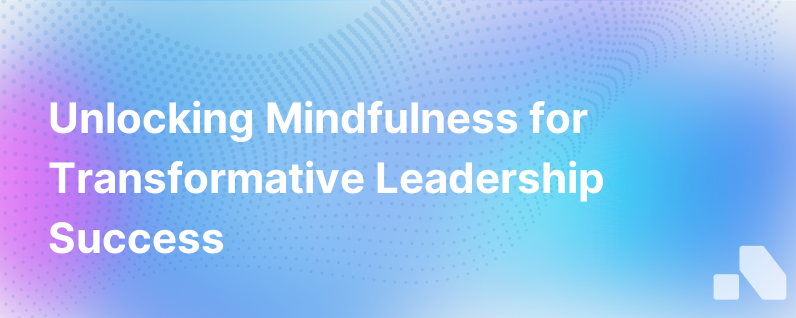
In the sphere of today's high-velocity corporate environment, businesses and individuals often seek productivity hacks, tools, and strategies to outpace the competition and achieve personal excellence. However, amidst this relentless pursuit, one ancient practice is rising to prominence due to its remarkable capacity to foster profound inner balance, enhance cognitive function, and create a ripple effect of positive change within professional and personal spaces: mindfulness.
While mindfulness may seem like another buzzword in the wellness industry, its infectious potential extends far beyond individual benefits. Mindfulness practices, when embraced holistically, carry a phenomenal potential to enrich workplace culture, leadership, and teamwork, which can ignite a cascade of positive change throughout an organization.
Let's explore the nuances of mindfulness, dissect its undeniable influence, and illustrate how it can become an infectious agent of transformation in both individual lives and the broader corporate realm.
Understanding Mindfulness
At its core, mindfulness is a state of active, open attention to the present moment. Practitioners learn to observe their thoughts and feelings without judgment and are encouraged to live in the here and now, rather than dwelling on the past or anticipating the future. This is often cultivated through meditation, but it is also a broader life orientation that can be nurtured throughout the day.
The Infectious Nature of Mindfulness
The infectious potential of mindfulness emerges from its fundamental ability to change how individuals perceive and interact with their environment. Encouraging a culture of mindfulness within a company can have the following implications:
-
Enhanced Emotional Intelligence: Mindfulness strengthens emotional intelligence, fostering more empathetic and understanding interactions between colleagues. This emotional resonance can encourage a more compassionate and supportive workplace culture.
-
Improved Focus and Productivity: By training the mind to focus on the current task, mindfulness effectively counteracts the productivity-killer of multitasking. Employees who practice mindfulness can often accomplish more in a shorter period, setting a precedent for efficiency.
-
Stress Reduction: Workplace stress is infectious, but so is calmness. Mindfulness practices like meditation are proven to reduce stress levels. As team members become calmer, the overall workplace environment becomes less reactive and more deliberate, benefiting everyone.
-
Better Decision Making: Heightened awareness of the present moment helps in making more considered and strategic decisions. This also becomes a collective gain as better decision-making processes at an individual level naturally elevate organizational judgment.
-
Increased Creativity and Innovation: Mindfulness encourages an open-minded perspective, which can enhance creative thinking and problem-solving skills across an organization.
The Ripple Effect in Organizational Culture
The infectious quality of mindfulness is most keenly observed in an organizational context. Leaders who practice mindfulness often exhibit more authentic leadership styles, emphasizing transparency, listening, and thoughtful interaction. This authenticity does not operate in isolation – it engenders trust and gives permission for others to operate from a similar place of honesty and integrity.
Additionally, mindfulness acts as a catalyst for transformative cultural shifts:
-
Spontaneous Collaboration: As mindfulness opens individuals to the fullness of the present moment, it fosters an environment where team collaboration and open dialogue are more likely to occur organically.
-
Conflict Resolution: Cultivating an attitude of acceptance and non-judgment makes it easier to navigate interpersonal difficulties and workplace conflicts, creating a contagiously amicable environment.
-
Resilience and Adaptation: Mindfulness equips individuals with the mental resilience to better cope with change, making organizational adaptation smoother in times of transition or crisis.
Practical Applications in the Workplace
The integration of mindfulness into corporate wellness programs points to its practicality. Whether it's through dedicated meditation rooms, structured programs, or mindfulness-based stress reduction (MBSR) initiatives, companies are investing in the mental and emotional well-being of their employees.
Among the most compelling applications is mindful leadership training, which emphasizes the cultivation of awareness, self-regulation, and compassion in leadership roles. This can directly influence organizational health and growth.
Individual mindfulness practices, like starting meetings with a minute of silence to focus participants' attention or encouraging 'mindful emailing,' where correspondence is crafted with intent and focus, can yield substantial cumulative benefits.
The Measurable Impact of Mindfulness
Research backs the claims of mindfulness advocates. Studies suggest mindfulness leads to decreased burnout, reduced turnover rates, and heightened levels of satisfaction among employees. What begins with individual practice becomes a measurable organizational advantage, as these qualities directly correlate with improved performance outcomes.
Spreading the Practice
How, then, does one implement and cultivate the infectious potential of mindfulness in a company? Leadership commitment is key. When leaders model mindfulness in their actions and decisions, it sets a domino effect of mindful practices throughout the organization. Similarly, providing structured mindfulness training and embedding the practice into daily routines can normalize and spread its use.
Summary
Mindfulness isn't simply a solitary pursuit; it's an influential paradigm that can shift the collective consciousness of an enterprise. By embodying and encouraging mindful practices, entrepreneurs, executives, and employees can nurturing a more conscious, cohesive, and thriving organizational ecosystem. Its potential is infectious, indeed – spreading from person to person, team to team, transcending beyond the walls of the workplace into larger communities, ultimately fostering societal well-being at scale.